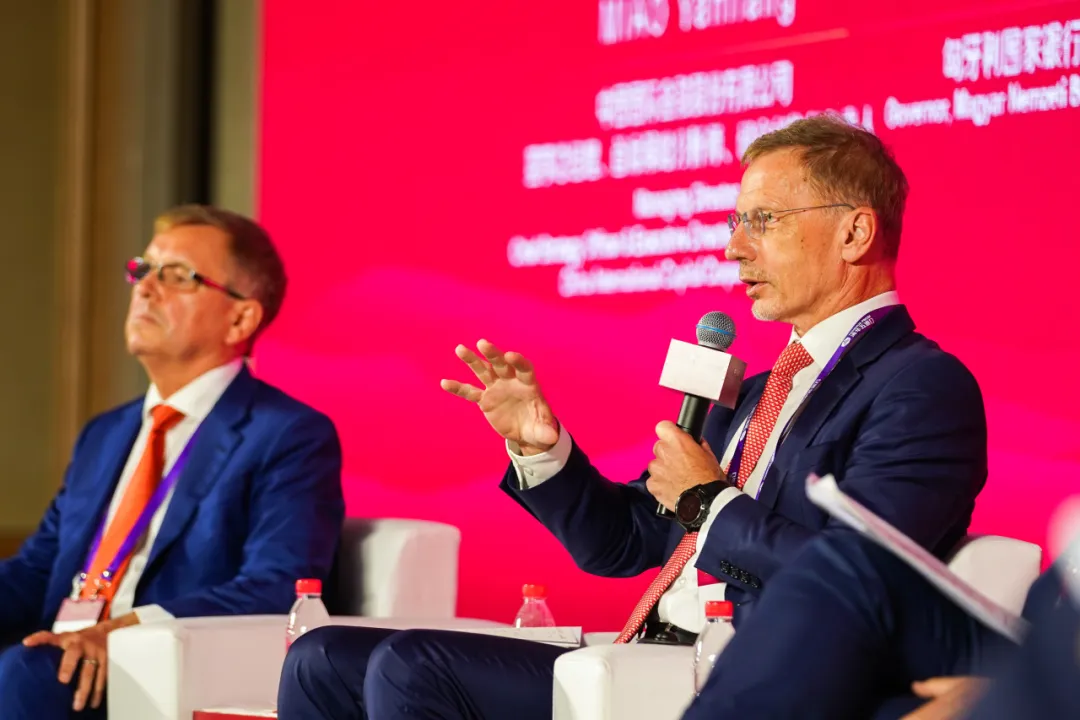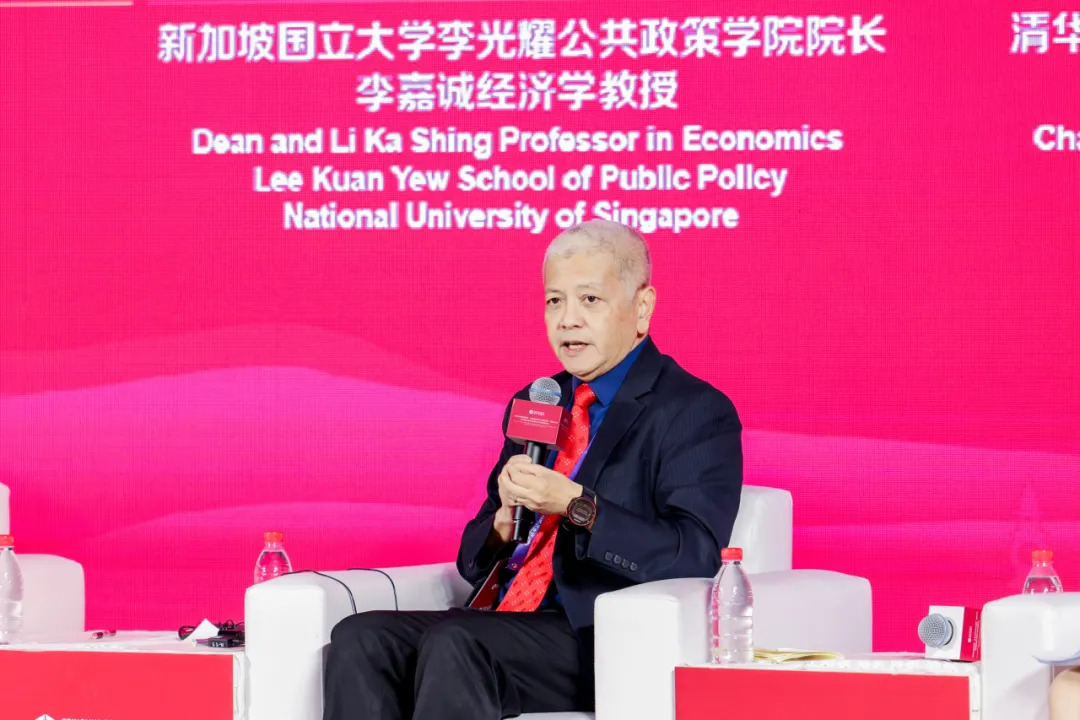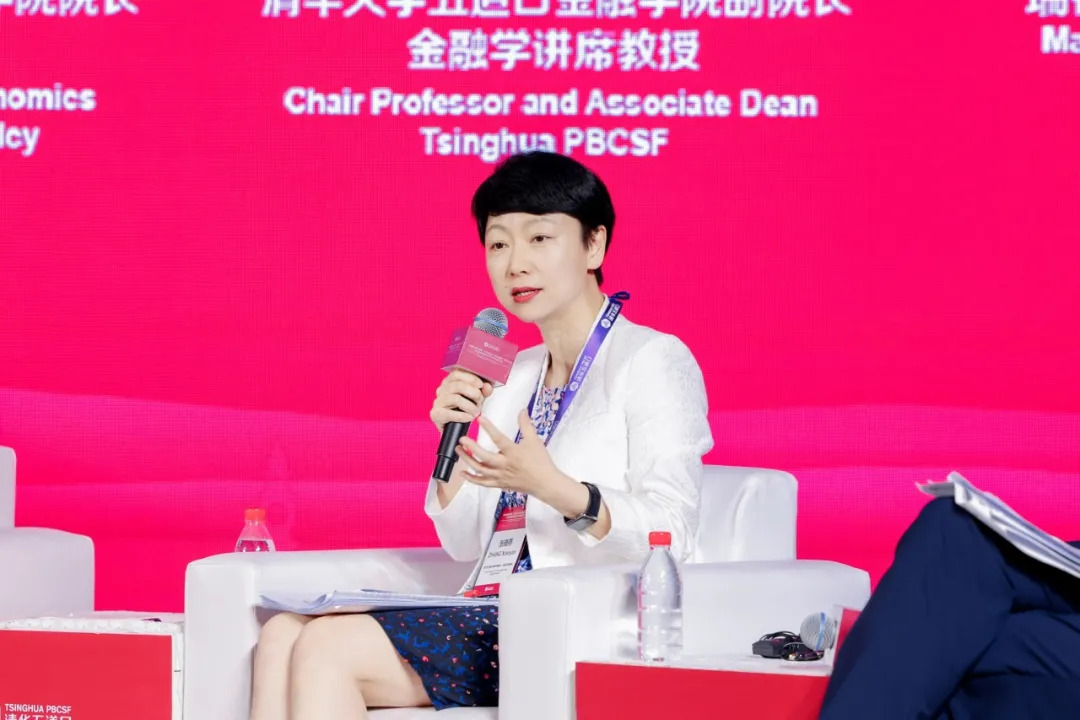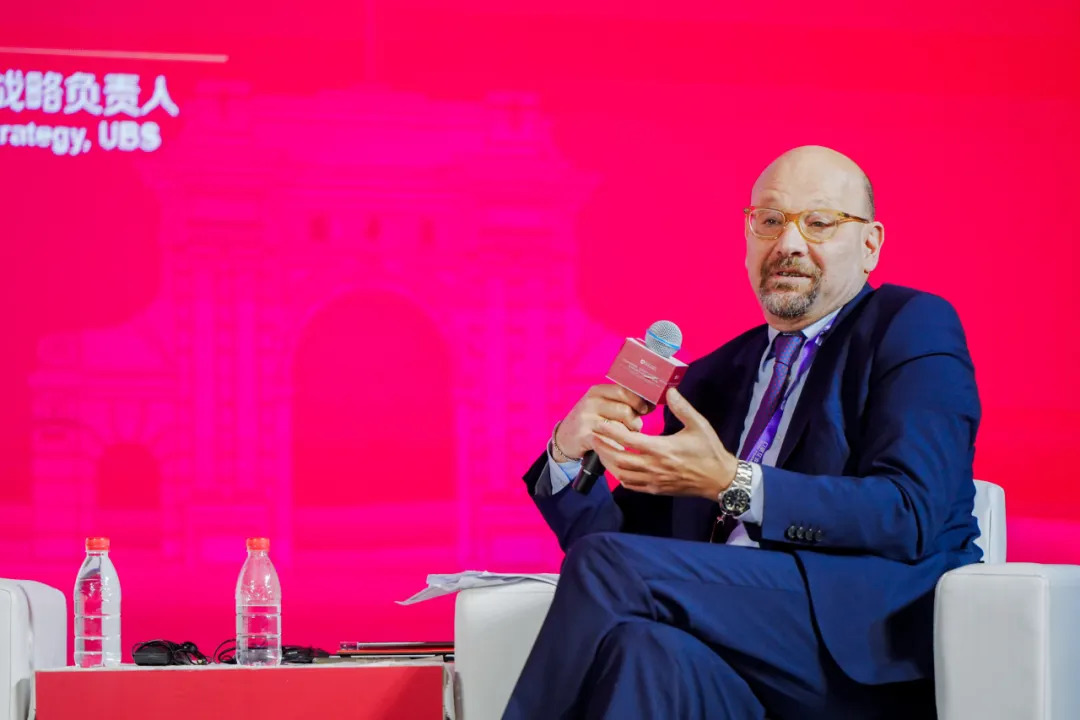On May 27-28, 2024, "80 Years after Bretton Woods: Building an International Monetary and Financial System for All" & 2024 Tsinghua PBCSF Global Finance Forum were successfully held in Hangzhou, Zhejiang Province, China. Focusing on the topic of implications for Global Financial Stability: Mitigating and Preventing Global Economic Fragmentation, this session brought together leading economists and policymakers to discuss the challenges and opportunities presented by the fragmentation of the global economy. Speakers highlighted both the historical successes of the global financial system and the need for renewed cooperation to address current economic uncertainties.

The picture shows the roundtable discussion in progress

The picture shows Miao Yanliang, the moderator of the roundtable discussion
The second session of the forum, moderated by MIAO Yanliang, Managing Director, Chief Strategy Officer & Executive Director of Research Department at China International Capital Corporation Limited, focused on the implications for global financial stability and strategies for mitigating and preventing global economic fragmentation. The panel featured distinguished speakers including György Matolcsy, Governor of the Magyar Nemzeti Bank in Hungary, Boris Vujčić, Governor of the Croatian National Bank, Lkhagvasuren Byadran, Governor of the Bank of Mongolia, Danny Quah, Dean and Li Ka Shing Professor in Economics at the Lee Kuan Yew School of Public Policy, National University of Singapore, ZHANG Xiaoyan, Chair Professor and Associate Dean at Tsinghua PBCSF and Massimiliano Castelli, Managing Director & Head of Strategy at UBS.

The picture shows György Matolcsy
György Matolcsy, in his keynote address, stated that the Bretton Woods system has had its successes in the past, demonstrating the cyclical nature of economic operations while showing that the agreement could not completely eliminate risks. We need to build upon the achievements of the Bretton Woods Agreement to reshape the Bretton Woods system, that is, to reshape the world financial order, in order to achieve long-term stability and security for the global economy. Matolcsy believes that finance must take responsibility by supporting the entire world's economic and social framework through sustainable financial and economic orders. We need cooperation and to build a new world to achieve success in areas such as digital transformation and sustainable development.

The picture shows Boris Vujčić
Boris Vujčić, believed that although there have been some adjustments in global trade channels and directions after 2020, the total volume of trade is still increasing. Looking at trade volumes in Asia, trade is expected to increasingly concentrate among the larger economies like China, India, and Indonesia, which are geographically close to each other, leading to significant growth in trade between them. Vujčić stated that the direction of Asian trade has clearly shifted towards China, India, and Indonesia, prompting these Asian countries to move towards de-dollarization. In the foreseeable future, while the dollar market is broad and deep, making it unlikely that a currency will replace the dollar in the short term, it is possible that a currency could supplant the dollar's position in the long term.

The picture shows Lkhagvasuren Byadran
Lkhagvasuren Byadran discussed how the fragmentation of the global economy has placed a burden on Mongolia. Mongolia is heavily reliant on international trade: its energy needs are predominantly met through imports; its exports, mainly including gold and coal, are directed 90% towards the same market. The closure of borders and disruptions in the supply chain during the pandemic brought inflation to Mongolia, reaching a historic high of 16% in 2022. Byadran stated that Mongolia’s experience demonstrates that the fragmentation of global trade affects the economic demands of smaller nations. During the geopolitical tensions caused by the Russia-Ukraine conflict, many countries imposed sanctions on Russia, which complicated Mongolia’s oil trade. Facing this trend, the first solution is to strengthen fiscal cooperation and enhance regional collaboration; second, international organizations like the IMF and the World Bank should offer more assistance to smaller countries.

The picture shows Danny Quah
Danny Quah expressed his views on multilateral cooperation and global governance. He stated that from the perspective of global economic governance, the fragmentation of the economy is becoming increasingly severe, and the costs of maintaining the old order and economic integration are rising, which everyone fears will eventually become unsustainable. Major power competition is the current global reality and an inevitable future trend. He pointed out that he hopes major powers can continue to deepen cooperation and play a more active role in global economic governance; he also hopes that the global economic governance system can become more equitable and reasonable, allowing emerging economies to have more say and decision-making power; he hopes that in setting up global coordination mechanisms, "small countries" can have more priority, ensuring a more equitable and reasonable development structure.

The picture shows Xiaoyan Zhang
Xiaoyan Zhang believes that the fragmentation of the global economy carries significant cost effects, and it is crucial to foster unity and collaboration to end economic fragmentation. From the 1990s to the early 21st century, emerging markets and developed countries became increasingly interconnected, and the trend towards globalization became more pronounced until the financial crisis of 2008, when the process of globalization began to slow down. It is particularly noteworthy that China's accession to the World Trade Organization (WTO) shaped a generation's view of global economic integration. Therefore, we need a more comprehensive view of the issues of global economic fragmentation and integration. On one hand, what exactly is the cost of globalization? Xiaoyan Zhang notes that for regulatory bodies and central banks, the 2008 financial crisis was a critical moment to tighten policies on global capital flows. Following the global financial crisis, skepticism about globalization grew, which is why we see the emergence of what is referred to as the fragmentation or breakdown of globalization. From a microeconomic perspective, many companies are opting to downsize in the current process of rising costs, which not only affects employment but also increases living costs; these are the negative impacts brought about by economic fragmentation. On the other hand, what is the future direction of global development? Zhang argues that since the onset of market fragmentation in 2008, we have been increasingly approaching a breaking point, and we are currently at a crucial moment that will determine the future direction of development. The cost effects of fragmentation are substantial, making it crucial to promote unity and collaboration to halt the development of economic fragmentation.

The picture shows Massimiliano Castelli
Massimiliano Castelli expressed that as the primary foreign currency reserve for many countries, the reserve amount held in U.S. dollars may decline over the next 15 to 20 years. If the U.S. economy faces a downturn, economies that overly rely on the U.S. dollar for their foreign exchange reserves will be directly impacted. The U.S. dollar is not a safe "haven," and if global geopolitical volatility increases, there may be a need to reduce reliance on the U.S. dollar. Therefore, when considering investment portfolios, investments in the euro and the renminbi should also be considered in addition to the U.S. dollar. Castelli believes that both from a theoretical and practical standpoint, we need a system that is not overly dependent on the U.S. dollar, and emerging countries will progressively hold fewer U.S. dollars in their reserves.